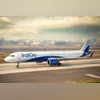India is the main market that offers a lot of potential and ATR is open for opportunities in terms of sourcing components from the country, according to a senior official of the European aircraft maker.
ATR, a joint venture between European aeronautics players Airbus and Leonardo, manufactures turboprops with up to 78 seats as well as freighters.
IndiGo and two regional carriers -- Alliance Air and FLY91 -- operate ATR planes that are used for regional flight operations.
ATR's Chief Commercial Officer Alexis Vidal told PTI in a recent interview that the company is looking at India as the main market and the country's regional air connectivity is very promising.
Currently, nearly 70 ATR planes are in operation in India and worldwide, the company has delivered around 1,700 aircraft.
Also Read
"We believe there is a potential in India for another 200 aircraft in the coming decade... All this, I believe very well supported by policy making... will drive additional aircraft into the country," he said and added that ATR is very eager to innovate and understand what the Indian ecosystem can offer.
India is one of the world's fastest growing civil aviation markets and domestic air traffic is on the rise while more Tier 2 and Tier 3 cities are also getting air connectivity.
According to him, there is a potential to have 300 new routes in the country with ATR planes.
Globally, ATR planes are being operated by around 200 operators in 100 countries, a vast majority of them being smaller operators.
"There is a lot of potential in India to partner... we don't have any major Tier 1 suppliers coming from India... having been in India for 25 years and looking at the next 25 years, we believe considering... sourcing more parts from India.
"... as a partner for local manufacturing and as a partner of choice for regional aircraft manufacturing, we are looking at the potential opportunities for sourcing components whenever it makes sense," Vidal said in the interview in the national capital.
To a question on whether ATR expects orders from existing or new clients, Vidal said it could be a combination of both.
Generally, regional air route refers to those within 400 nautical miles.
"90 per cent of intra city trips are happening within 400 nautical miles, which is 750 kilometres... 97 per cent is cars, buses and rails which leaves only 3 per cent for air transportation. That is where you realise the potential of India. If you benchmark that against other places in Europe and Asia, that number will be double or triple.
"From 3 per cent regional connectivity to 6 or 9 per cent will be a tremendous increase in air transportation for regional aircraft in India," Vidal said.
Given the potential of the market in India and the relevance of ATR as a product, he said it is quite natural that the company is entertaining discussions with different parties for the purpose of serving the customers and enabling common man of India to fly.
On whether eVTOL (electric Vertical Take Off and Landing) aircraft could be a challenge, Vidal said it will be complementary.
"It will complement... I look at intra city regional mobility... in the last five years, 200 routes have been opened by ATR and some of them have upgraded to larger jets. That is the success that our aircraft is allowing airlines and governments to create routes, connectivity... I really see urban, regional and non-regional domestic as three complimentary segments. We are the centre piece of that," he said.
(Only the headline and picture of this report may have been reworked by the Business Standard staff; the rest of the content is auto-generated from a syndicated feed.)

)
